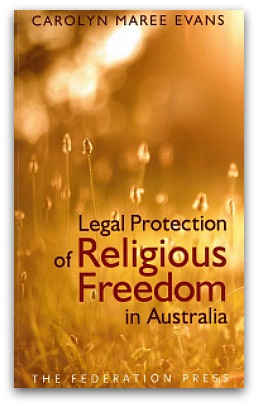Keywords: Religious Beliefs
There are more than 200 results, only the first 200 are displayed here.
-

RELIGION
- Frank Brennan
- 18 March 2013
3 Comments
Change is upon the Church. Just recall the scene when the new pope emerged on the Vatican balcony. He appeared with none of the papal trimmings of office, and did not once did he refer to the papacy. Could something of this new papal style help Catholics engage more creatively with their fellow citizens? Text from Frank Brennan's lecture 'How Can the Catholic Church Contribute to a Better Culture for Life?'
READ MORE
-

AUSTRALIA
- Frank Brennan
- 19 February 2013
34 Comments
There has been some very confused debate about the Government's proposed consolidation of anti-discrimination laws. David Marr claimed leaders of 'conservative faiths' were free to 'kick poofters, lesbians, single mothers, people in de facto relationships'. He needs to take a cold shower while we clarify these issues.
READ MORE 
-

AUSTRALIA
- Moira Rayner
- 25 January 2013
21 Comments
Anti-discrimination acts are meant to protect vulnerable people, not corporations or dominant ideologies. The employers I represent reap the benefits of understanding that diversity and inclusion are brilliant for business and productivity. The Government's new human rights consolidation bill has missed simple opportunities for real improvement.
READ MORE 
-

RELIGION
- Frank Brennan
- 23 November 2012
1 Comment
'Might not the chief problem with Church language in the public square be that we tend to come from a position of moral superiority, approaching those dreadfully compromised politicians who will do anything to be elected? The abuse crisis reminds us that the Church is not irreproachable.' Text from Fr Frank Brennan's presentation at the Anglican Church of Australia's Public Affairs Commission Conference, November 2012.
READ MORE
-

RELIGION
- Frank Brennan
- 05 October 2012
15 Comments
The nation is the better for policies and funding arrangements that encourage public and private providers of healthcare, including the Churches. The public may need to be patient with Church authorities as they discern appropriate moral responses to new technologies. This is a small price to pay.
READ MORE 
-

RELIGION
- Frank Brennan
- 02 October 2012
6 Comments
'It has been helpful to have the Pope offer the encouragement that there need not be any conflict between Christian faith and Aboriginal culture. But Aboriginal culture is often founded on religious beliefs which find and express God's self-communication outside of Christ and the Church's seven sacraments.' Fr Frank Brennan SJ's address 'Culturally Enriched Through the Gospel' at the NATSICC Conference on 1 October 2012.
READ MORE
-

RELIGION
- Frank Brennan
- 24 September 2012
10 Comments
'Looking to the future, I want to focus on the role of the laity in the growing absence of priests. And I want to insist on the need for due process, transparency and respectful dealing within the Church.' Full text of Fr Frank Brennan SJ's presentation 'Looking Back and Looking Forward Over Church and Life on the 50th Anniversary of Vatican II' at the Spirituality in the Pub Goulburn Valley Annual Dinner, 21 September 2012.
READ MORE
-

RELIGION
- Frank Brennan
- 18 September 2012
'The common law leaves a gap between the mandates of the law and the conduct that we choose to engage in according to our individual moral standards. We call that gap 'freedom'. The challenge is determining the width of that gap for groups bound by religious faith which differs from the Australian majority.' Frank Brennan launches Carolyn Evans' Legal Protection of Religious Freedom in Australia. Full text
READ MORE
-

RELIGION
- Andrew Hamilton
- 13 September 2012
18 Comments
Many conflicts over religious freedom are associated with discrimination: the freedom of schools to employ only Christian staff, or of ministers to conduct marriages only between a man and a woman. Many see these pressures to limit religious freedom as part of a concerted effort by secularist forces. They don't have to be seen that way.
READ MORE 
-

RELIGION
- Frank Brennan
- 07 September 2012
18 Comments
Church groups in Australia have vigorously campaigned to protect themselves from particular equal opportunity laws. While there is agreement about a faith community's right to employ practising believers, there is plenty of room for disagreement as to how most prudently and charitably to exercise that right.
READ MORE
-

INTERNATIONAL
- Moira Byrne Garton
- 29 June 2012
6 Comments
Earlier this month a Canadian Supreme Court effectively legalised physician-assisted euthanasia. While there is a general perception that those opposed to euthanasia do so on religious grounds, many people with disabilities oppose euthanasia because they believe it is bad policy that denies their right to live.
READ MORE 
-

EUREKA STREET TV
- Peter KIrkwood
- 01 June 2012
READ MORE 